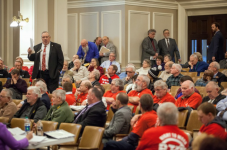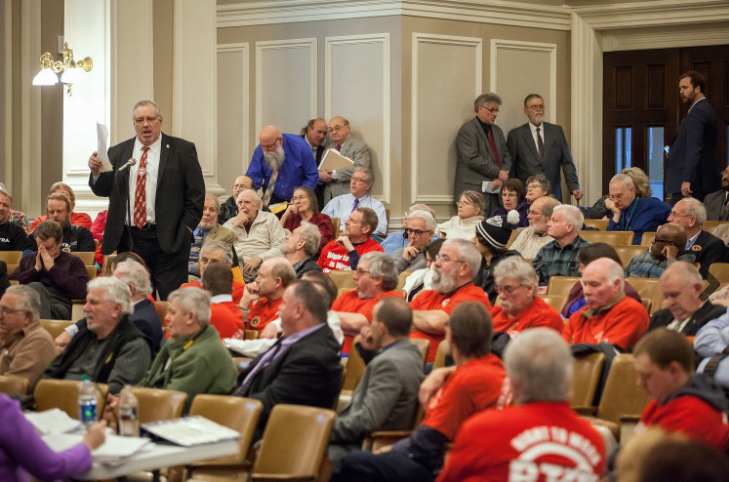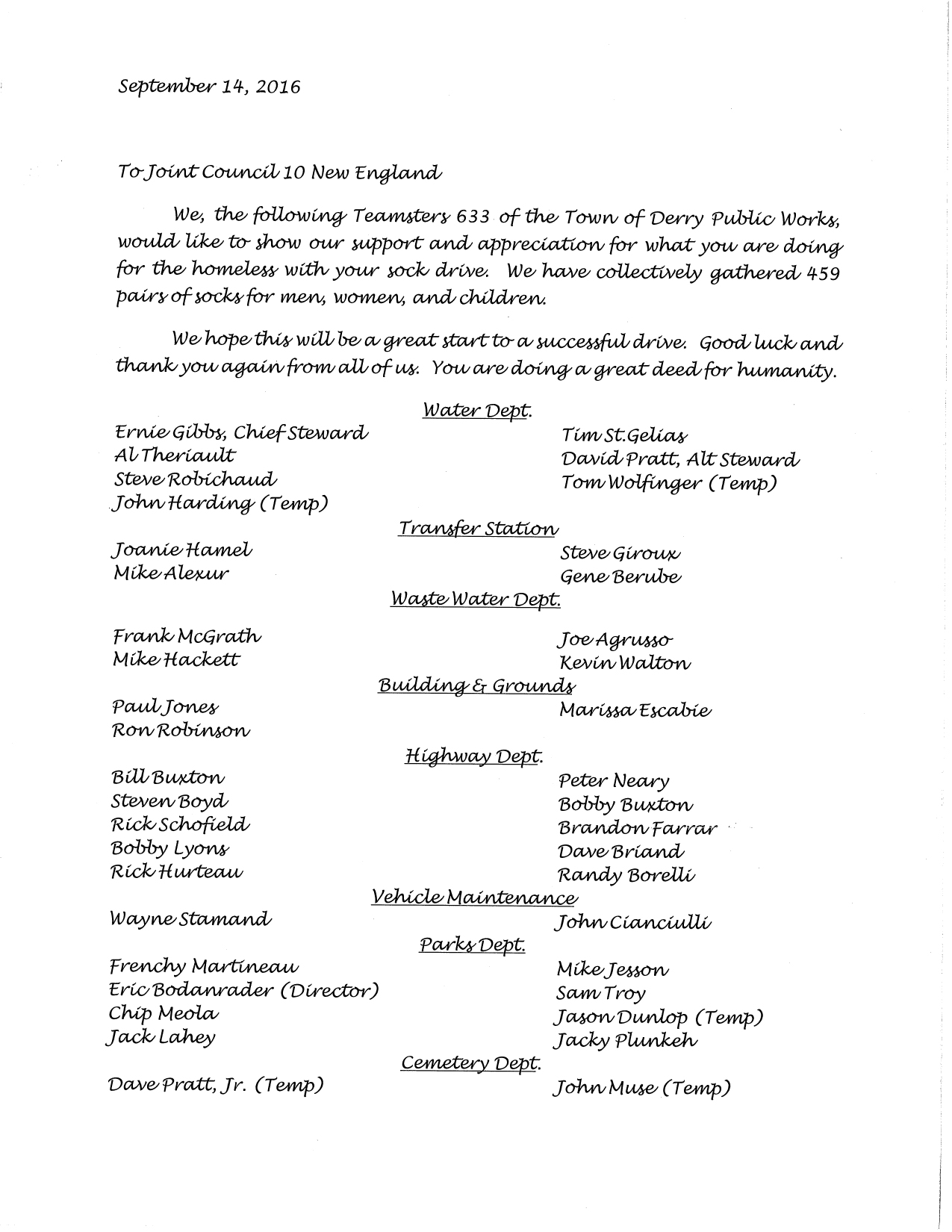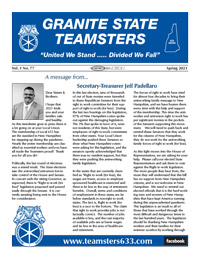A Word from Jeff Padellaro
Local 633 Stronger Than Ever!
Over the past several years, Local 633 has continued to grow in membership. This growth may be attributed to the diverse backgrounds of our Business Agents, Field Representatives and Executive Board. Our recent successes include organizing school bus drivers, and public sector employees, which include law enforcement, town highway, … Continue reading →
United Parcel Service
Granite State Teamsters Newsletter
Bulletin Board
Local 633 Snapshots
NEXT MEMBERSHIP MEETING JANUARY 12, 2025 AT 10:00 a.m.The General Membership Meeting scheduled for this Sunday, December 6, 2020, at 10:00 a.m., will be held virtually on GoToWebinar. This decision was made out of an abundance of caution in light of the rising nuber of COVID-19 cases in NH. The Christmas raffle will be held this Spring when … Continue reading →
Senator Shaheen meets with Unions to Discuss Labor Issues
Principal Officer Jeffrey Padellaro requested that President Kevin Foley and Local 633’s Political Consultant and Lobbyist, Dennis Caza, attend a meeting with Senator Jeanne Shaheen where many issues concerning our members were discussed. Topics discussed included the Butch Lewis Act of 2019, which has been referred to the Committee on … Continue reading →
LOCAL 633 EXECUTIVE BOARD SWORN IN BY SEAN O’BRIEN
Sean O’Brien, President and Principal Officer of Local 25, attended our Local Monthly Memebership Meeting to address the membership and swear in Local 633’s Executive Board. Sean discussed the importance of getting our younger members involved in the Union to keep the fight for workers’ rights going. His message was … Continue reading →
2018 Scholarship Recipients!
Principal Officer Jeff Padellaro and the Executive Board are pleased to announce the recipients of the 2018 Scholarship Awards granted by Teamsters Local 633. “This is truly demonstrative of Teamsters helping Teamsters,” Jeff stated. The awardees were notified by mail on July 17, 2018, of their scholarship consisting of $1,000. … Continue reading →
In Memoriam
633 Posts Archive
- October 2024
- February 2024
- March 2023
- April 2021
- February 2021
- December 2020
- February 2020
- January 2019
- August 2018
- July 2018
- March 2018
- February 2018
- January 2018
- December 2017
- November 2017
- October 2017
- September 2017
- August 2017
- July 2017
- June 2017
- April 2017
- February 2017
- January 2017
- December 2016
- September 2016
- June 2016
- May 2016
- November 2015
- October 2015
- September 2015
- October 2014
Author Archives: admin633
Teamster Local 633 Motorcycle Ride Lakes Region

Critically Low Staffing Levels Create Safety Crisis in NH State Prisons

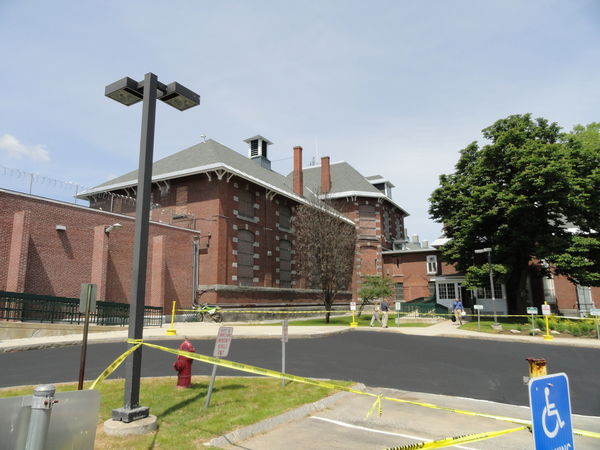
Concord, NH (June 29, 2017) – Teamsters Local 633 today urged people across New Hampshire to get behind correctional officers who are warning of a major safety crisis in the NH state prison system…. see full article on Concord Patch. https://patch.com/new-hampshire/concord-nh/critically-low-staffing-levels-create-safety-crisis-nh-state-prisons
FORCED OVERTIME EXHAUSTS PRISON OFFICERS,COSTS STATE MILLIONS
Overtime Exhaustion
For more than a decade, New Hampshire prisons have been under enormous pressure. The prison population has gone up as staff numbers have gone down. Aside from the inmates, few feel the consequences as acutely as the state’s correctional officers.
Corrections Sergeant Justin Jardine represents prison officers with the State Employees’ union. “I’m working approximately 3 double shifts a week, so 64 hours a week,”says Jardine. Younger officers, Jardine says, work 4 or 5 double shifts — around 80 hours a week.
The overtime is forced. That means if officers refuse to work, they’ll be disciplined — whatever the circumstances. And although you can volunteer to work overtime shifts that fit your schedule, officers often don’t find out they can’t go home until they get to work.
The money is good – overtime earns time and a half. A sergeant like Jardine can walk home with almost $70,000 a year. But, Jardine says, “no matter how money hungry you are, no one wants to do that for years on end. And it’s been years now.”
Prison Guard Shortage
In 2004, a prison staffing analysis found the Concord prison for men needs 371 officers to operate normally; 277 for critical operations. Today, they are down to 198. Initially, positions were left vacant due to budget cuts across the department. Now, says warden Richard Gerry, the problem is finding qualified recruits.
The overtime is forced. That means if officers refuse to work, they’ll be disciplined — whatever the circumstances.
“We get a lot of applications,” Gerry says, “but then putting them through the different steps in our hiring process — a lot don’t show up, or they don’t pass the hiring phasing.”
There may be a snowball effect, too. The worse the working conditions, the harder it is to convince new recruits to sign on. Commissioner Bill Wrenn says the problem is about to get worse.
“Employees’ average age is increasing,” he says, and with aging state employees comes retirement. “They have the ability to retire after 20 years at age 45.”
A 2012 state audit warned the more burned out the officers are, the more likely they are to take their benefits and retire. In fact, the department has lost many more officers than they’ve hired for five years running.
Overtime Costs
Since 2010, paying overtime has cost the state $3.5 million dollars more than it would have spent paying full time employees.
Governor Maggie Hassan says she and Commissioner Wrenn are trying to fix things. “We have redesigned the process,” she says, “moving the application process online,” and streamlining the testing process.
The DOC still has only one employee responsible for recruitment and hiring. But now, 27 staff volunteers are going to job fairs, and even making follow up calls to applicants who fail to show up on test days.
But there may be a bigger problem for the Department of Corrections: New Hampshire’s economy is actually doing well.
Salary Competition
A.T. Wall, the president of the Association of State Correctional Administrators, says prison jobs are hard, dangerous, and require nights and weekends. He’s not surprised people opt for other jobs in a place like New Hampshire, where unemployment is low, “and where correctional officer salary and benefits lag behind what someone could make in another position.”
Right now, correctional officer salaries start at $33,600, which is $10,000 less than salaries at local police departments. However, policy makers aren’t talking about immediately boosting salaries. Governor Hassan says she wants to test the new online application process, first.
Inmate Outcomes Suffer
In the meantime, things at the Concord state prison for men do not look good. Inmate Eric Grant has been at the prison for 24 years, on a second degree murder charge. He says he’s found officers sleeping when they should be watching security cameras. “It happens,” says Grant. “I’m not gonna say all the time, but, his job is to monitor the unit, so in front of him there could be an assault going on and he wouldn’t see it.”
Grant says staff cutbacks have consequences. As staffing levels have dropped, inmate assaults have risen 30 percent during the last decade. Recidivism rates are up 60 percent.
Of course, there’s more to those numbers than just staffing. Prisons are overcrowded; there are growing racial tensions and increased drug use behind prison bars. At the same time, treatment programs, educational classes, work programs — even visiting hours and sports — have been all been cut back.
As Grant sees it “everything’s related to everything,” when it comes to inmate outcomes.
With 55 officers becoming eligible for retirement this year, this staffing shortage may get worse before it gets better.
UPS Rising

UPS Rising represents more than 250,000 Teamsters throughout the United States who work at UPS and UPS Freight. As UPS is the single largest employer of our union, our strength at UPS is the strength of the entire Teamsters union. We are RISING up to ensure that management abides by the UPS National Master Agreement (the largest collective bargaining agreement in North America) and the UPS Freight National Master Agreement. We are RISING as UPS package car drivers, air drivers, feeder drivers, part-time loaders, unloaders, sorters, clerks, freight drivers and dockworkers – for a strong contact in 2018!
Follow the latest at https://www.facebook.com/TeamUPSrising/
Members who attended Right to Work hearing in Concord this week.

Dennis Caza speaks at Right to Work hearing
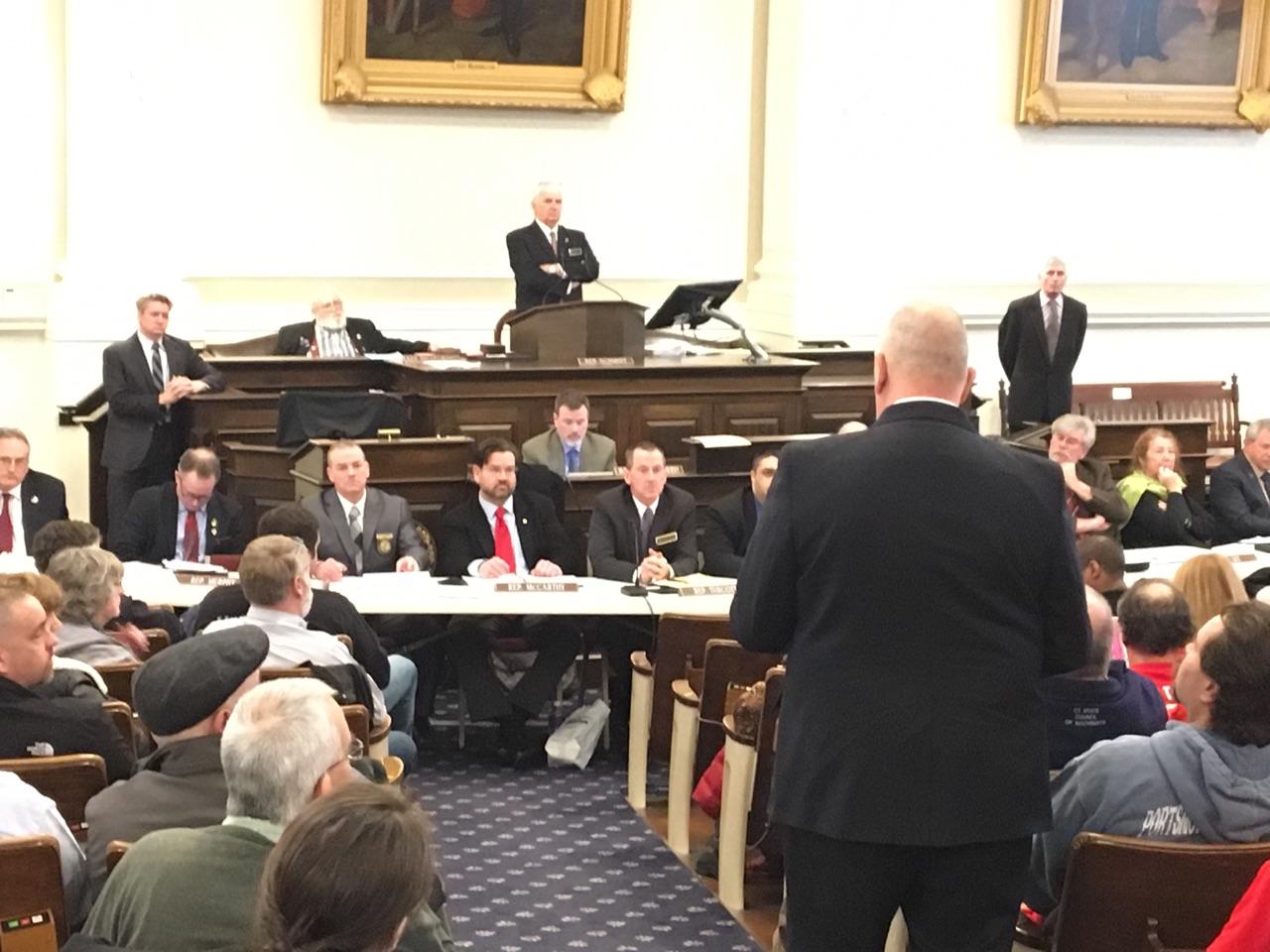
Thousands of New Hampshire Workers Launch New Fight to Stop Harmful Right to Work Legislation
Thousands of New Hampshire Workers Launch New Fight to Stop Harmful Right to Work Legislation
Workers across New Hampshire to contact legislators in effort to prevent Right to Work bill that would drive down wages, weaken the middle class and threaten economic growth
Concord, NH (February 7, 2017) – Thousands of workers with Teamsters Union Local 633 today launched a new campaign to block harmful Right to Work legislation that could drive down wages and hurt New Hampshire’s economy.
Workers with Teamsters Local 633 are encouraging union members and voters across New Hampshire to call and write their legislators to voice their opposition to Right to Work bills in advance of a key hearing on Wednesday, February 8th.
If passed, the New Hampshire Right to Work law could make it easier for businesses to pay lower wages, cut health and retirement benefits, reduce worker protections, and shift jobs out of state or overseas. The state senate recently passed the Right to Work bill, and legislation is now under consideration in the house.
“This Right to Work law will hurt middle class families and do nothing to spur economic growthin our state,” said Dennis Caza, President of Teamsters Union Local 633. “Given the challenges resulting from stagnating wages and rising income inequality, why make it easier for companies to drive down pay even when corporate profits rise? We hope workers in every industry across the state will contact their legislators and let them know that Right to Work is bad for New Hampshire and has no place here.”
New Hampshire has the lowest unemployment rate in the nation, and currently there are more than 20,000 open job positions across the state. If passed, the Right to Work law will provide no incentives to keep businesses in state. At the same time, it could make it more difficult for New Hampshire to address its single biggest economic challenge: attracting enough workers to fill critical job openings. This is because Right to Work laws often result in lower wages and weaker job protections – two elements that make it hard to attract workers.
“It’s no secret that employers identify the inability to fill crucial job openings – not Right to Work – as a key barrier to increased economic growth in New Hampshire,” said Jeffrey Padellaro, Secretary-Treasurer and Principal Officer of Teamsters Local 633. “New Hampshire is on the right track with a growing innovation economy and the lowest unemployment rate in the country. We should focus on keeping companies in our state, instead of putting these gains at risk for a Right to Work law that has a poor track record of success in other states where similar legislation has passed.”
Twenty-seven states currently have enacted Right to Work laws, including many states with higher unemployment rates and weaker economic growth. Nine out of 10 states with the highest poverty rates are those with Right to Work laws, while workers in Right to Work states earn on average about 25 percent less in pay and benefits that states without these laws.
Right now, union members in New Hampshire contribute financially and share the costs of union representation. If Right to Work is passed, it would interfere with this practice and enable union workers to benefit from hard-fought negotiations – receiving all the financial benefits – without contributing their fair share. It would also severely impact a union’s ability to advocate for its members, particularly on key issues of wages, benefits and workplace protections.
“Right to Work laws use the false promise of economic growth to weaken organized labor and cut wages to hurt the middle class,” said Sean O’Brien, Secretary-Treasurer and Principal Executive Officer of Teamsters Joint Council 10, which represents 22 Teamsters unions in New England. “New England states have consistently rejected Right to Work legislation because workers and employers understand that these laws are ill conceived and unnecessary, and that they weaken, rather than strengthen, state economies.”
Teamsters Local 633 represents more than 4,700 New Hampshire workers in a variety of fields, including thousands of men and women who serve the public each day. This includes UPS, public works employees, bus drivers, police, power plant and warehouse workers, airport maintenance, school principals, pipeline workers, race track employees and Anheuser-Busch workers. For more information, please visit www. http://teamsters633.com/
2017 Scholarship Applications are now online
Teamster Scholarships
2017 scholarship applications click here:
Hundreds fill Representatives Hall for hearing on right-to-work bill
STA Windham/Pelham collected 866 pairs of socks!
Derry Public Works members collected 459 pairs of socks for charity
IMPORTANT NOTICE regarding Monday night sessions
Effective for the months of June, July and August 2016, there will be NO Monday night sessions ( 5 pm to 7 pm) for the summer months.
If there is an emergency please call your business agents on their respective cell numbers.
We will let you know if the Monday night sessions will continue after August.
New Hampshire Police

Police officers are those unique individuals who run toward danger when the rest of the population are running from the danger. Every day the men and women who don the uniform do so with the knowledge that they have to be ready for whatever may come their way. The Teamsters Local 633 proudly represent the numerous agencies throughout New Hampshire and appreciate their service to domestic peace. Police officers control traffic, mediate family or domestic disputes, and render life-saving first aid and patrol the roadways for individuals who would do us harm. They risk their lives on a daily basis and ask nothing more than a decent wage and benefits to protect their families. Local 633 is one of the few Unions who has submitted legislation regarding the “Laurie Issue” and has testified before the legislature concerning the lack of consistency of its application throughout the Granite State. We are honored to vigorously represent the men and women who protect us every day and ensure that the terms and conditions of their employment meet or exceed their expectations. To respond to use-of-force situations, Local 633 has a “Go Team” that includes the Business Agent and an attorney with 26 years of law enforcement experience as a state trooper.


